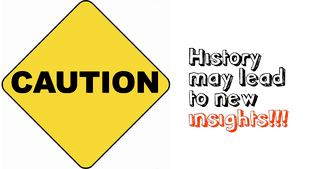
|

|
| This Web Site is dedicated to the Memories & Spirit of the Game as only Ken Aston could teach it... |
| Enjoy, your journey here on... KenAston.org |
| Ken Aston Referee Society ~ Football Encyclopedia Bible |
Football and the Second World War
|
| Source - References |
| On 15th March, 1939, Adolf
Hitler ordered the German Army to invade Czechoslovakia. It seemed that
war was inevitable. Harry Goslin and fourteen members of the Bolton
Wanderers squad decided to join the Territorial Army. Other clubs like
Liverpool and West Ham United also persuaded their players to join the
territorial's. Politicians continued to negotiate in an attempt to avoid a war. On 29th September, 1938, Neville Chamberlain, Adolf Hitler, Edouard Daladier and Benito Mussolini signed the Munich Agreement which transferred to Germany the Sudetenland, a fortified frontier region that contained a large German-speaking population. When Eduard Benes, Czechoslovakia's head of state, who had not been invited to Munich, protested at this decision, Chamberlain told him that Britain would be unwilling to go to war over the issue of the Sudetenland. The Munich Agreement was popular with most people in Britain because it appeared to have prevented a war with Nazi Germany. Some people disagreed with this point of view. George Kay, the manager of Liverpool, did not trust Adolf Hitler and joined the Territorial Army. He also encouraged his players to join. Charlie Paynter, the manager of West Ham United, also persuaded his players and staff to join the Territorial's. Tommy Lawton pointed out in his autobiography, Football is my Business: "Then came the war and, with it, the end of my career or so I felt. Surely there couldn't be room for a professional footballer in a world gone crazy? I, of course, being a young, fit man of approaching twenty would go into the services. Meanwhile, in the leisure time I had left I wound up my personal affairs, cursed Hitler and all his rats and occasionally sat down to think of what had been and what might have been." On 15th March, 1939, Adolf Hitler ordered the German Army to invade Czechoslovakia. It seemed that war was inevitable. On 8th April, Bolton Wanderers played a home game against Sunderland. Before the game started, Harry Goslin, the team captain, spoke to the crowd: "We are facing a national emergency. But this danger can be met, if everybody keeps a cool head, and knows what to do. This is something you can't leave to the other fellow, everybody has a share to do." Of the 35 players on the staff of Bolton Wanderers, 32 joined the armed services and the other three went into the coal mines and munitions. This included Harry Hubbick, who resumed his career down the pits and Jack Atkinson and George Hunt served in the local police force. A total of 17 players, including Harry Goslin, Danny Winter, Billy Ithell, Albert Geldard, Tommy Sinclair, Don Howe, Ray Westwood, Ernie Forrest, Jackie Roberts, Jack Hurst and Stan Hanson, joined the 53rd (Bolton) Field Regiment. Bolton Wanderers players in 1939: Billy Ithell, Danny Winter, Jackie Roberts,George Caterall, Don Howe and Harry Goslin. |
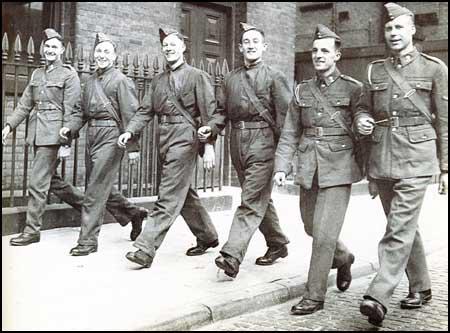 Bolton Wanderers players in 1939: Billy Ithell, Danny Winter, Jackie Roberts George Caterall, Don Howe and Harry Goslin. |
|
It was decided that the Football League should begin on 26th August.
More than 600,000 people watched these games. On Friday, 1st September,
1939, Adolf Hitler ordered the invasion of Poland. The football that
Saturday went ahead as Neville Chamberlain did not declare war on
Germany until Sunday, 3rd September. The government immediately imposed
a ban on the assembly of crowds and as a result the Football League
competition was brought to an end. Blackpool, who had won all three
games so far that season, was top of the First Division table at the
time. On 14th September, the government gave permission for football clubs to play friendly matches. In the interests of public safety, the number of spectators allowed to see these games was limited to 8,000. These arrangements were later revised, and clubs were allowed gates of 15,000 from tickets purchased on the day of the game through the turnstiles. |
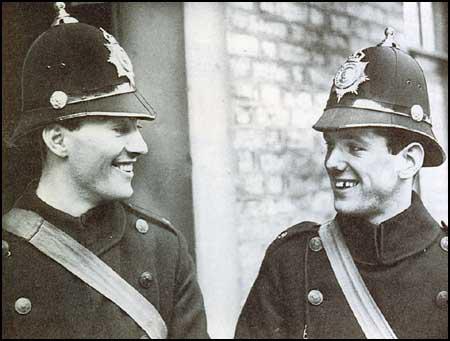 Jack Fairbrother and Willie Hamilton of Preston North End... Both joined the Blackburn Police Force on the outbreak of the war. |
|
The government imposed a fifty mile travelling limit and the Football
League divided all the clubs into seven regional areas where games could
take place. London clubs arranged for their regional competition to
begin on the last Saturday in October. One group was composed of
Arsenal, Brentford, Charlton, Chelsea, Fulham, Millwall, Tottenham
Hotspur and West Ham United. The other group included Aldershot,
Brighton, Clapton Orient, Crystal Palace, Leyton Orient, QPR, Reading,
Southend and Watford. Some of the players had already joined the armed forces. West Ham United decided that this was unfair on those players who were unavailable for selection. The club decided to pay all their players thirty shillings a week whether or not they played. Shortly afterwards, the Management Committee of the Football League passed a resolution instructing all clubs to follow West Ham's example. |
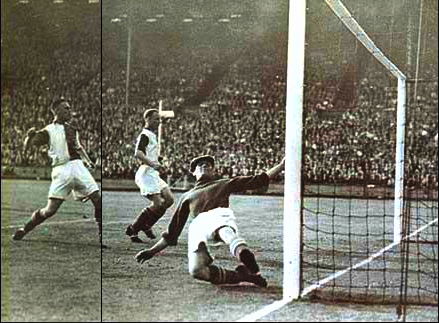 James Barron, the Blackburn Rovers goalkeeper is beaten by a shot from... Sam Small of West Ham United in the 1940 Football League Cup Final. |
|
After the declaration of war in September 1939, Adolf Hitler did not
order the attack of France or Britain as he believed there was still a
chance to negotiate an end to the conflict between the countries. This
period became known as the Phoney War. As Britain had not experienced
any bombing raids, the Football League decided to start a new
competition entitled the Football League War Cup. The entire competition of 137 games including replays was condensed into nine weeks. However, by the time the final took place, the "Phoney War" had come to an end. On 10th May, 1940, Adolf Hitler launched his Western Offensive and invaded France. In the days leading up to the final, the British Expeditionary Force was being evacuated from Dunkirk. In the final held at Wembley on 8th June, 1940, West Ham United beat Blackburn Rovers 1-0. Despite the fears that London would be bombed by the Luftwaffe, over 42,300 fans decided to take the risk of visiting Wembley. The only goal was scored by Sam Small after a shot from George Foreman had been blocked by James Barron, the Blackburn goalkeeper. |
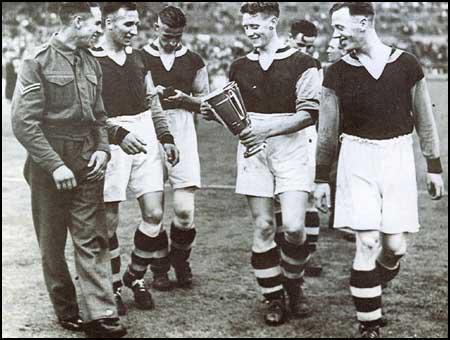 West Ham players celebrate winning the Football League Cup Final. Left to right, Corporal Norman Corbett, Ted Fenton, Charlie Bicknell, Archie Macaulay and George Foreman. |
|
The Luftwaffe carried out its first bombing raid of London on 10th July,
1940. During the Battle of Britain clubs continued to play football. On
19th September, 1940, soon after the beginning of the Blitz, the
Football Association relaxed their ban on Sunday football to provide
recreation for war workers. Winston Churchill took the view that the
continuation of football was good for the morale of the nation. Between September 1940 and May 1941, the Luftwaffe made 127 large-scale night raids. Of these, 71 were targeted on London. The main targets outside the capital were Liverpool, Birmingham, Plymouth, Bristol, Glasgow, Southampton, Coventry, Hull, Portsmouth, Manchester, Belfast, Sheffield, Newcastle, Nottingham and Cardiff. Some two million houses (60 per cent of these in London) were destroyed and 60,000 civilians were killed and 87,000 were seriously injured. Of those killed, the majority lived in London. |
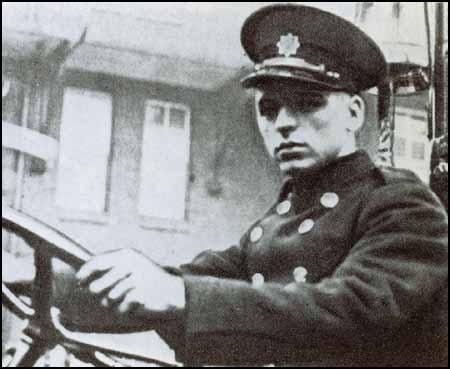 Raich Carter while working for the Auxiliary Fire Service in 1940. |
|
On the outbreak of the Second World War the England inside-forward,
Raich Carter, joined the Sunderland Fire Service. This was a reserved
occupation and his action was interpreted as being a tactic to avoid
military service. As a result, Carter was often booed by the crowd in
friendly games he played during the conflict. This caused Carter a great
deal of stress and on 2nd October 1941 he joined the RAF. Like most
professional footballers, Carter became a Physical Training Instructor,
and did not see any action during the war. Major Frank Buckley had been a senior officer in the Football Battalion during the First World War. He attempted to re-join the British Army in 1939 but at the age of 56 he was considered too old. However, he was manager of Wolves at the time and did encourage his players to join the armed forces. According to the Football Association publication, Victory Was The Goal (1945), between 3 September 1939 and the end of the war, 91 men joined the armed forces from Wolves, 76 from Liverpool, 65 from Huddersfield Town, 63 from Leicester City, 62 from Charlton, 55 from Preston North End, 52 from Burnley, 50 from Sheffield Wednesday, 44 from Chelsea, 41 each from Brentford and Southampton, and each from Sunderland and West Ham United. On 12th May, 1940, Adolf Hitler ordered the invasion of France. The 53rd (Bolton) Field Regiment was sent to help the French but came under attack from the advancing Panzer divisions. Harry Goslin was credited with destroying four enemy tanks and this resulted in him being promoted to the rank of Lieutenant. Goslin, Don Howe, Ray Westwood, Ernie Forrest, Jack Hurst and Stan Hanson, were lucky to make it back to the French port of Dunkirk where they were rescued by British ships. |
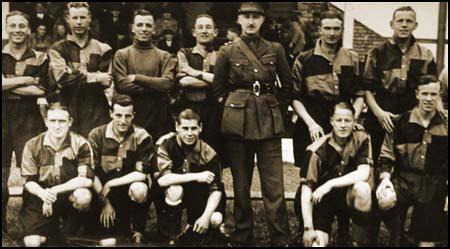 53rd (Bolton) Field Regiment football team: Standing: Danny Winter, Harry Goslin, Stan Hanson, George Catterall, (Lt Col G. Bennet), Billy Ithell, Jack Hurst Front row: Albert Geldard, Don Howe, Ray Westwood, Jackie Roberts, Tommy Sinclair. |
|
In January 1940 Wilf Mannion was conscripted into the British Army. He
was sent to France and took part in the battle to stop the advance of
the German Army during the Western Offensive. A local newspaper reported
that Mannion had been killed but he was one of the soldiers who was
evacuated from Dunkirk. On his return to England he was selected to play for his country in an unofficial international against Scotland in January 1942. Soon afterwards Wilf Mannion was sent to South Africa. On 10th July 1943 he was a member of the force that invaded Sicily in an attempt to overthrow Benito Mussolini. His commanding officer was Hedley Verity, the England cricketer. Mannion later recalled: "I remember we lost half the company that day. We were pinned down all day by the enemy. Hedley was caught in the crossfire and hit in the chest. He was a wonderful man and I was his company runner for a number of years. We served together all over the place." |
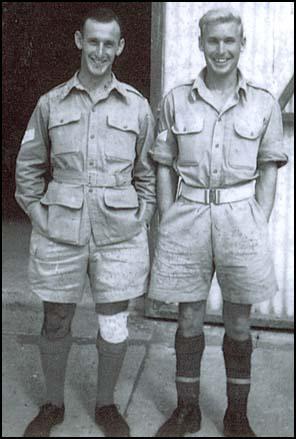 Bertie Mee and Wilf Mannion in Cairo. |
|
Wilf Mannion also took part in the battles around Anzio on the way to
take Rome. Such was the losses that Mannion's battalion was eventually
withdrawn so it could be reorganized and reinforced. Bertie Mee, who
served with Mannion, later reported that: "He'd had such a rough time
that medically he was downgraded, withdrawn from active service and sent
to our convalescence depot. He had gone from an A1 to a B1 - the lowest
grade still considered rehabitable. But when you're in the line and
someone gets killed next to you, I can understand you losing it." He was
sent to Cairo to recover but soon after arriving he developed malaria. While some footballers joined the armed forces, others found occupation in the support services. Jack Fairbrother and Willie Hamilton of Preston North End joined the police force, whereas Ernie Callaghan of Aston Villa, served as a reserve policeman and was awarded the British Empire Medal for conspicuous bravery during a bombing raid on Birmingham in September 1942. Raich Carter was employed by the Auxiliary Fire Service while continuing to play Sunderland. The ageing Arsenal star, Joe Hulme, became a reserve policeman and Joe Cockroft returned to Sheffield to work in the steel industry. The Blitz was still taking place when the 1941 Football League Cup Final took place at Wembley on 31st May. Preston North End and Arsenal drew 1-1 in front of a 60,000 crowd. Preston won the replay at Blackburn, 2-1. Robert Beattie got both of Preston's goals. |
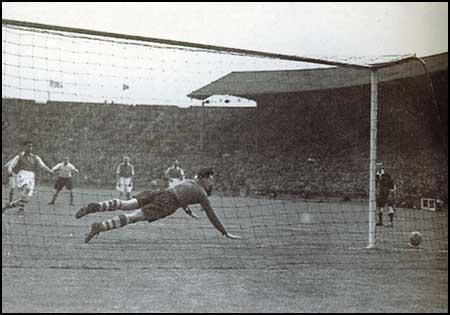 Jack Fairbrother (Preston North End) attempts to stop a penalty kick by... Leslie Compton (Arsenal) during the 1941 Football League Cup Final. |
|
n the 1940-1941 season Preston North End needed to win their last game
against Liverpool to win the North Regional League title. The nineteen
year old Andrew McLaren scored all six goals in the 6-1 victory. There
is no doubt that during this period Preston was the best football club
in England. This great team was broken up by the Second World War. In
1942 Tom Finney, their star player, was called up to the Royal Armoured
Corps and later fought under General Bernard Montgomery in the Eighth
Army in North Africa. Wolves also won the Football League War Cup in 1942 beating Sunderland 4-1. The team included Eric Robinson who was to be tragically killed during a military training exercise soon afterwards. The British Army invited some of the best footballers to became Physical Training instructors at Aldershot. Those who accepted the offer included Joe Mercer, Cliff Britton, Tommy Lawton, Matt Busby, Stan Cullis, Don Welsh, Billy Cook, Arthur Cunliffe, Billy Wright, Archie Macaulay, Norman Corbett, Bert Sproston and Eric Stephenson. |
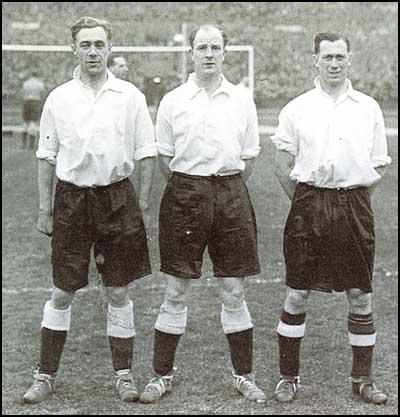 England's half-back line of Cliff Britton, Stan Cullis and Joe Mercer played for Aldershot during the war. |
|
Most of Arsenal's first-team joined the Royal Air Force. This included
Ted Drake, Jack Crayston, Eddie Hapgood, Leslie Jones, Bernard Joy, Alf
Kirchen, Laurie Scott and George Swindin. Some of them got jobs as
Physical Training instructors and did not see action overseas, whereas
others in the team went abroad. This included Dennis Compton (India),
Bryn Jones (Italy), Reg Lewis (Germany) and Ted Platt (North Africa).
Tom Whittaker, the Arsenal trainer, was promoted to the rank of Squadron
Leader and won the MBE for his role in the D-Day operations. Some of Britain's top footballers served abroad. This included Harry Goslin, Albert Geldard, Ray Westwood, Jack Roberts, Dick Walker, George Male, Tom Finney, Arthur Rowley, Robert Langton, Wilf Copping, Andrew Beattie, Robert Langton, Wilf Mannion, Danny Winter, Billy Ithell, Albert Geldard, Tommy Sinclair, Don Howe, Ray Westwood, Joe Rooney, Ernie Forrest, Jackie Roberts, Jack Hurst and Stan Hanson. Ernie Taylor, who had joined Newcastle United in the early part of the war was in the Royal Navy and served in the Submarine Service. |
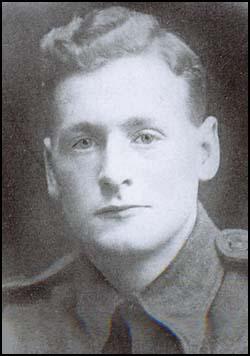 Tom Finney in his army uniform. |
|
Arsenal lost the use of its ground during the war as Highbury was used
as an Air Raid Patrol Centre. Plymouth Argyle Home Park ground was badly
damaged during an air raid in February 1941. So also was the grounds of
Sunderland (Roker Park), Sheffield United (Bramall Lane), Chelsea
(Stamford Bridge) and Southampton (Dell). Ten bombs that hit the Bramall
Lane ground in December 1940, demolished half the John Street Stand and
badly damaged the pitch. One of the bombs dropped on Roker Park in
March, 1943, killed a policeman. The Dell was so badly damaged that
Southampton had to play its games at the Pirelli Sports Ground in
Eastleigh. In August, 1944, a V1 Flying bomb hit the greyhound kennels close to Wembley Stadium. Several dogs escaped and the last of them were rounded up over a week after the bombing raid had taken place. Blackpool's Bloomfield Road ground was used as a RAF training centre. Preston's Deepdale was used to hold captured prisoners during the Second World War. The military gave the club £250 a year in compensation. Unofficial international games also took place during the war. Over 78,000 fans watched the England game against Scotland at Hampden Park, Glasgow, during the Blitz. England's Harry Goslin played in four unofficial internationals during the Second World War. On 12th May, 1940, Adolf Hitler ordered the invasion of France. As a member of the 53rd (Bolton) Field Regiment Goslin was sent to help the French but came under attack from the advancing Panzer divisions. Harry Goslin was credited with destroying four enemy tanks and this resulted in him being promoted to the rank of Lieutenant. |
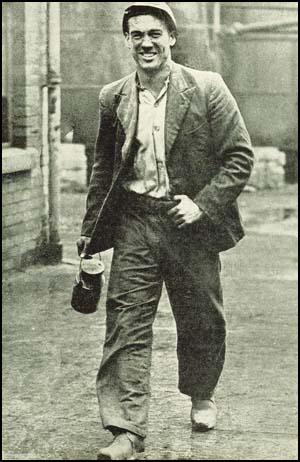 Nat Lofthouse as a Bevin Boy |
|
On 22nd March 1941, the 15 year-old Nat Lofthouse made his debut for
Bolton Wanderers. Bolton won the game 5-1 with Lofthouse scoring two of
the goals. He now became a first-team regular. He continued to score on
a regular basis but in 1943 he became a Bevin Boy and worked as a miner
in a local colliery. As Dean Hayes points out in his book, Bolton
Wanderers (1999): "Bevin Boy Lofthouse's Saturdays went like this: up at
3.30 a.m., catching the 4.30 tram to work; eight hours down the pit
pushing tubs; collected by the team coach; playing for Bolton. But work
down the mine toughened him physically and the caustic humor of his
fellow miners made sure he never became arrogant about his success on
the field." In his autobiography Goals Galore (1954) Nat Lofthouse comments that: "I was only eighteen when I reported at Mossley Colliery, near Bolton, a pit in which I knew many of the Wanderers' supporters worked. I must admit that, although it was only a forty-five minutes' tram-ride from home, I had never visited such distant parts. The one thing that sticks in my mind about that morning was the miners going on shift carrying their famous lamps." Len Shackleton also worked down the mines as a Bevin Boy in the later stages of the war. He later recalled what it was like to be a miner: "My papers to report as a Bevin Boy duly arrived, even though I had warned the postman not to worry if he accidentally mislaid an OHMS envelope addressed to Len Shackleton... I thought it was a severe enough shock having to leave home at six o'clock in the morning, but that was nothing compared to the experience of my first descent in the pit cage. For the benefit of anyone who has not travelled in one of those torture boxes, let me make it quite clear that a pit cage is nothing like a department store lift, although it is rumored the same principle of operation is employed. Going down in a pit cage is a terrifying experience: it is like being suspended on a piece of elastic. One minute you are rushing into the bowels of the earth, imagining Brisbane to be the next stop; the next minute you stop suddenly and ... just dangle. One day at Fryston was sufficient to convince me I had made a real blunder by volunteering for mining." |
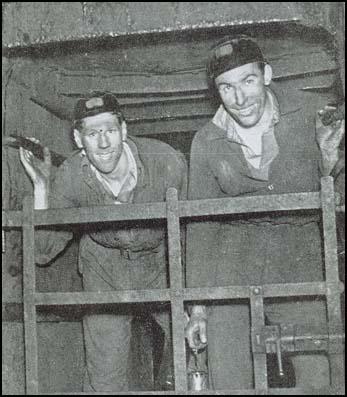 Bolton Wanderers players in 1939: Billy Ithell, Danny Winter, Jackie Roberts George Caterall, Don Howe and Harry Goslin. |
|
Jackie Milburn came from a family of coalminers and began work at the
Ashington Coal Company in 1940. Later he worked at Hazelrigg Colliery
and in 1943 he signed for Newcastle United. He purchased an old
motorcycle and dressed in full pit gear, he could often been seen racing
to the ground after work. Milburn told Mick Bell, who was a shop steward
at the colliery, that he believed that working on a Saturday morning was
affecting his performance on the field. After consulting with the other
workers, who were all Newcastle United fans, Bell now went to see the
colliery manager and threatened strike action if Jackie Milburn was not
given the morning off on the day of a game. Faced with the threat of
industrial action the colliery manager reluctantly agreed to Bell's
request." On 15th July 1942, the 53rd (Bolton) Field Regiment was told to mobilize for overseas service. The following month they arrived in Egypt and immediately became involved in defending Alam el Halfa. On 30th August, 1942, General Erwin Rommel attacked Alam el Halfa but was repulsed by the Eighth Army. General Bernard Montgomery responded to this attack by ordering his troops to reinforce the defensive line from the coast to the impassable Qattara Depression. On 1st November 1942, Montgomery launched an attack on the Deutsches Afrika Korps at Kidney Ridge. After initially resisting the attack, Rommel decided he no longer had the resources to hold his line and on the 3rd November he ordered his troops to withdraw. However, Adolf Hitler overruled his commander and the Germans were forced to stand and fight. The next day General Bernard Montgomery ordered his men forward. Lieutenant Harry Goslin and the 53rd (Bolton) Field Regiment joined the pursuit. The Eighth Army broke through the German lines and Erwin Rommel, in danger of being surrounded, was forced to retreat. Those soldiers on foot, including large numbers of Italian soldiers, were unable to move fast enough and were taken prisoner. The British Army recaptured Tobruk on 12th November, 1942. During the El Alamein campaign half of Rommel's 100,000 man army was killed, wounded or taken prisoner. After spending time in Baghdad, the 53rd (Bolton) Field Regiment moved to Kirkurk on 8th January 1943. They were eventually relocated to Kifri which was to become their main base for the next five months. While there Harry Goslin, Stan Hanson, Don Howe and Ernie Forrest played for the British Army against the Polish Army in Baghdad. |
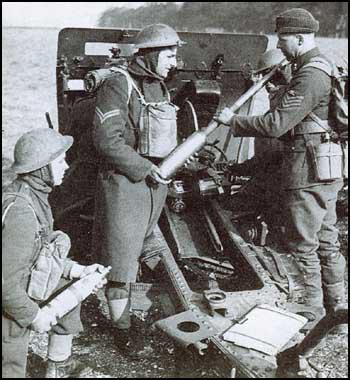 Sergeant Harry Goslin (right), the English international centre-half was killed in Italy on 18th December, 1943. |
|
The 53rd (Bolton) Field Regiment joined General Bernard Montgomery and
the 8th Army in the invasion of Italy. On 24th September, 1943,
Lieutenant Harry Goslin and his men landed at Taranto. Three days later
the men had reached Foggia without too much opposition. However, when
the men were ordered to cross the River Sangro the regiment took part in
some of the most difficult fighting of the Second World War. At the end of November Don Howe was wounded and evacuated to a dressing station. After another enemy air attack Ray Westwood and Stan Hanson came close to being killed. The shelling continued and on 14th December, 1943, Harry Goslin was hit in the back by shrapnel. He died from his wounds a few days later. The Bolton Evening News reported: "Harry Goslin was one of the finest types professional football breeds. Not only in the personal sense, but for the club's sake, and the game's sake. I regret his life has had to be sacrificed in the cause of war." Other footballers killed in the Second World War included Walter Sidebottom who played for Bolton Wanderers, and was considered one of the best young prospects in the Football League, was drowned when his ship was torpedoed in the English Channel in November 1943. Joe Rooney, who played for Wolverhampton Wanderers, was killed in an air raid in Belfast in June 1941. Fred Fisher, who played football for Barnsley and Millwall, was killed in September, 1944. William Imrie, who had played for Blackburn Rovers and Newcastle United during the 1930s, was in the Royal Air Force and lost his life during a raid in 1945. Eight players registered with Arsenal died during the Second World War. Bobby Daniel, a Flight Sergeant Gunner in the RAF, was killed on 23rd December 1943. Other Arsenal players in the RAF who died included Sidney Pugh, Harry Cook and Leslie Lack. |
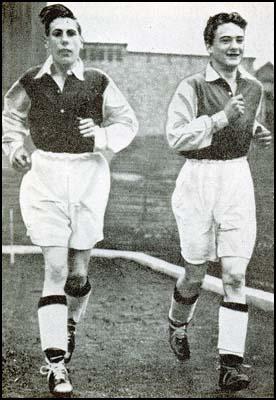 Len Shackleton with Bobby Daniel at Highbury. Daniel joined the RAF on the outbreak of the Second World War and was killed on 23rd December 1943. |
|
Bill Dean, a goalkeeper who got into the Arsenal team in 1940, told
friends: "Well I have fulfilled my life's ambition, I have played for
Arsenal." Dean died in action with the Royal Navy in March 1942. Three Arsenal players who joined the Royal Fusiliers also lost their lives. Hugh Glass was drowned at sea in 1943, Cyril Tooze was killed by a sniper's bullet in Italy on 10th February 1944 and Herbie Roberts, a regular in Arsenal's team that won a hat trick of League Championships between 1932 and 1935, became a lieutenant in the Royal Fusilliers. He died of erysipelas on 19th June 1944. Most Luftwaffe air raids took place at night. To protect their planes from fighter planes and the heavy artillery below, the German pilots flew thousands of feet above the ground. This made it hard for the Germans to find and hit their targets. To make it even more difficult for the German bombers, the British government imposed a total blackout during the war. Every person had to make sure that they did not provide any lights that would give clues to the German pilots that they were passing over built-up areas. |
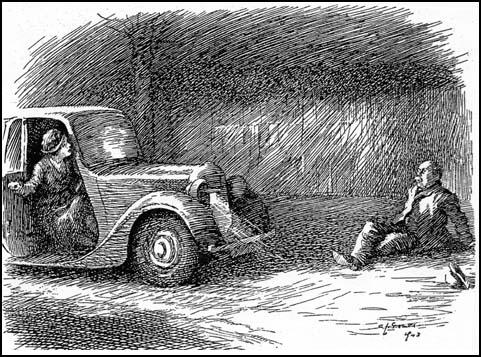 "Is that you John? I was afraid I might miss you in the blackout." Cartoon published in March, 1943 |
|
At first, no light whatsoever was allowed on the streets. All street
lights were turned off. Even the red glow from a cigarette was banned,
and a man who struck a match to look for his false teeth was fined ten
shillings. Later, permission was given for small torches to be used on
the streets, providing the beam was masked by tissue paper and pointed
downwards. The blackout caused serious problems for people travelling by motor car. In 1939 only car sidelights were allowed. The results were alarming. Car accidents increased and the number of people killed on the roads almost doubled. The king's surgeon, Wilfed Trotter, wrote an article for the British Medical Journal where he pointed out that by "frightening the nation into blackout regulations, the Luftwaffe was able to kill 600 British citizens a month without ever taking to the air, at a cost to itself of exactly nothing." One of those killed was Jack Lambert of Arsenal who had won league championship medals in 1930-31 and 1932-33. |
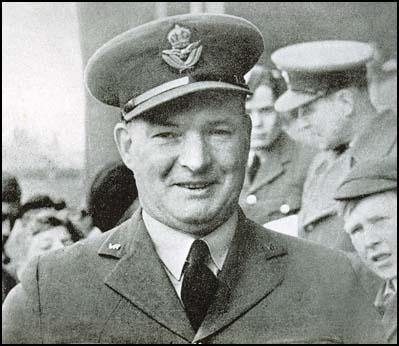 Squadron Leader Tom Whittaker |
|
Liverpool and England full-back, Tom Cooper, was a sergeant in the
Military Police. He was killed on 25th June 1940 near Aldeburgh when his
motor cycle was involved in a head on crash with a bus. As a result of
his death the military issued an order that all servicemen were no
longer allowed to ride their motorcycles without wearing a crash helmet. George Bullock, who played for Barnsley and served in the Royal Navy, was another road victim when he was killed on 2nd June 1943. This included Percival Thomas Taylor, who made five appearances in wartime football for Preston North End. Taylor scored a hat trick while playing as a guest for Middlesbrough against Bradford City on 4th April 1942. He was killed in a motor cycle accident six days later. |
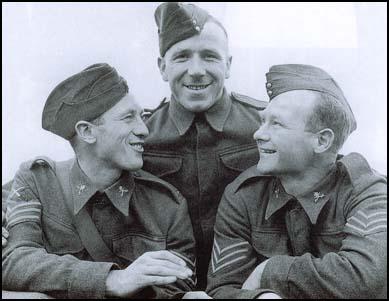 Joe Mercer, Matt Busby and Don Welsh as... Army Sergeants. |
|
Stan Mortensen, who played for England and Blackpool after the war,
narrowly escaped death when his Wellington bomber crashed into a forest
near Lossiemouth. Mortensen, who was an air-gunner, escaped with head
injuries but the pilot and bomb aimer were killed and the navigator lost
a leg. Jackie Stamps of Derby County was badly wounded during the retreat from France in 1940. He was told he would never play again but the doctors were wrong and he managed to have a successful post-war career. The England international player, Wilf Mannion, was at Dunkirk and later saw action in North Africa. Roy White, a sergeant of the British Expeditionary Army and was also involved in the retreat from France in 1940. His boat was torpedoed and by the time he was picked up it was discovered he had gone blind. After two months in hospital he recovered his sight and eventually reached the rank of major. After the war he played for Tottenham Hotspur. |
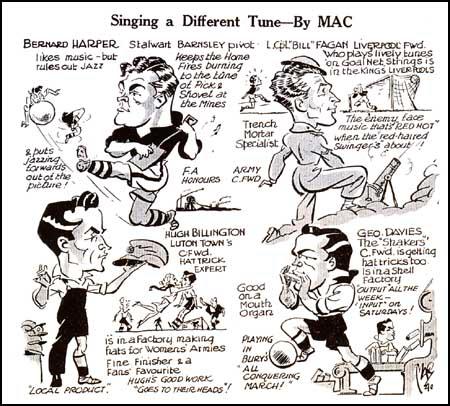 "Mac" (Douglas Machin) drew this cartoon for The Topical Times (3rd February, 1940) |
|
Jackie Bray, the Manchester City player, joined the Royal Air Force in
1940. He won the British Empire Medal and later worked in the unit that
rehabilitated wounded fighter pilots. His club mate, Eric Westwood, took
part in the D-Day landings and was mentioned in dispatches. Bill
Shorthouse was badly wounded at Normandy but survived to play for
Wolverhampton Wanderers after the war. Bill Edrich, better known as a cricketer but also played football for Tottenham Hotspur, was a Squadron Leader pilot who took part in several bombing raids on Nazi Germany. Harold White, who played for West Bromwich Albion before the war, won the Military Medal in March 1942. Dick Walker of West Ham United was a sergeant with an infantry battalion who fought from El Alamein to Italy and was several times mentioned in dispatches. Alf Fields, the Arsenal centre-half, was also in North Africa and Italy and won the British Empire Medal. So was Corporal Alex Munro of Blackpool but was captured by the German Army in July 1942. He survived three years in a POW camp and resumed his football career after the war. Henry Roberts, who played for Millwall in the 1930s, was captured in a Commando raid on St Nazaire. He was wounded in both legs and spent the rest of the war at a POW camp in Germany. Fred Chadwick of Ipswich Town and Albert Hall of Tottenham Hotspur were both captured by the Japanese Army while they were in Singapore. and spent several years in captivity. Hall escaped when he was one of the 58 survivors from a Japanese transport ship which was sunk in the Pacific in September 1943. Chadwick also survived several years of captivity and both men returned to play in the Football League after the war. |
| Source - References |
|
(1) Tom Finney, My Autobiography (2003) I vividly recall Neville Chamberlain's depressing broadcast to the nation on that Sunday morning, 3 September 1939, two days after German forces had invaded Poland. After attending morning service at St Jude's, I called in on a mate of mine, Tommy Johnson, a fellow plumber, and he was glued to the wireless as the news we all dreaded came through. League football was suspended, players were told that they would be paid up to the end of the week only, and supporters were informed that there would be no refund on season tickets. Andy Beattie, another of North End's 'Great Scots' and a man for whom I held the utmost respect, was due a richly deserved benefit match. The war ensured that didn't materialise. Contracts were effectively cancelled although clubs retained players' registrations. Preston made strenuous efforts to get players fixed up with jobs - Bill Shankly found employment shoveling sand, George Mutch building airplanes and Jack Fairbrother joined up as a policeman. Troops were stationed at Deepdale, and police and military use of the ground continued through until 1946. Wartime football was no substitute for the real thing but it did serve a purpose. There were restrictions galore and most clubs found their squads decimated through call-ups into the armed services, but the public passion for football won through. Sometimes matches were in doubt right up to kick-off as clubs tried desperately to recruit some guest players, but when the action rolled it was good. Football provided the country with some much-needed escapism and, speaking as a player, it was thoroughly enjoyable - despite the bombs. After we had lost 2-0 at Anfield, our coach-ride home was caught up in an air-raid on Merseyside and that was a frightening experience by any standards. The 1940-41 season was a shortened affair but Preston United did well. We finished as Northern Section champions, which was some achievement considering the fact that we had struggled at the wrong end of the First Division up to war being declared. (2) Tommy Lawton, Football is my Business (2003) Then came the war and, with it, the end of my career or so I felt. Surely there couldn't be room for a professional footballer in a world gone crazy? I, of course, being a young, fit man of approaching twenty would go into the services. Meanwhile, in the leisure time I had left I wound up my personal affairs, cursed Hitler and all his rats and occasionally sat down to think of what had been and what might have been. (3) Stan Mortensen, Football is My Game (1949) During my time in the R.A.F. I was pushed around the country in the fashion only too familiar to millions of men... The football I played during the war period was important. This was the time when I began to play alongside recognised internationals, and was myself, in turn, spotted by selectors of various representative teams. I was sent to Padgate in Lancashire; then home again; then to Blackpool, where forty thousand other R.A.F. types were training ; thence to Compton Bassett in Wiltshire; back to Blackpool; Yatesbury in Wiltshire; Walney Island; Lossiemouth; Eastchurch; Blackpool; Chigwell; and London. It was while I was at Lossiemouth that I met with the accident which nipped my "career" as a wireless-operator air-gunner in the bud, and prevented me from being sent abroad. We were on operational training; the Wellington caught fire, and down we went in a dive. We finished in a fir-plantation, the pilot and bomb-aimer were killed, the navigator lost a leg, and I got out alive with various injuries of which the worst was a head wound which called for a dozen stitches. The doctors decided that my injuries were such that I would never again be fit for operational duties, and naturally enough I wondered about my football career. Should I ever be able to head a ball again? If not, I was finished, because heading the ball is half of my game. (4) Tommy Lawton, Football is my Business (1948) Then came the war and, with it, the end of my career or so I felt. Surely there couldn't be room for a professional footballer in a world gone crazy? I, of course, being a young, fit man of approaching twenty would go into the services. Meanwhile, in the leisure time I had left I wound up my personal affairs, cursed Hitler and all his rats and occasionally sat down to think of what had been and what might have been... I was one of the fortunate's who, by reason of my retention in this country on Army service, was able to get in my weekly game throughout the period of hostilities. And incidentally there was periodical hostility from people who thought it wrong that fit, able-bodied young fellows like myself should be playing football in England while their husbands, sons and sweethearts were fighting in the sun-baked deserts of Libya and the Middle East, were flying out over Europe or were dying in the dangerous seas. I am not going to defend myself, I have done nothing to defend myself against. The War Moguls ordered that I stayed in England to do my war job. Football was incidental, but in its way it too played a part. I appeared in hundreds of charity matches for England, the Army, combined services and unit sides. Let me make it clear. I didn't ask to stay in England. (5) Nat Lofthouse, Goals Galore (1954) The miners of Britain are the finest fellows in the world. How do I know? Because I became a "Bevin Boy" during the war and worked alongside these men-men in every sense of the word. But it did not take me long to realize that in most cases their rugged exteriors hid hearts of gold. I was only eighteen when I reported at Mossley Colliery, near Bolton, a pit in which I knew many of the Wanderers' supporters worked. I must admit that, although it was only a forty-five minutes' tram-ride from home, I had never visited such "distant parts". The one thing that sticks in my mind about that morning was the miners going on shift carrying their famous lamps. Mr. Massey, the Labor Officer to whom I reported, was a sympathetic and understanding official. I think he realized that many youngsters like me, who were being whisked away from ordinary jobs to completely new surroundings, found things strange, and had he been my own father, Mr. Massey could not have gone to greater lengths in his efforts to make me feel at home. To all intents and purposes that first day at the pit-head was like reporting to an Army or Navy depot. I was shown round the pit, saw the baths, was taken to the locker-room to get my number, then on to the lamp-room, where again I was given a number, and back to the office for a pay-check number, finally I was issued with a pit helmet. Candidly, none of this interested me a great deal. I felt I was only in the mining business because of National Service, and after I'd had a meal at the canteen and boarded the tram for home, a wave of depression swept over me. I wondered why I hadn't become a soldier like so many other footballers. But who was I to grumble? While many of my friends were fighting overseas I could still go home to my family. Later, I derived some comfort by reminding myself of this when things didn't go well at the pit. The following day I reported once more at Mossley Common - this time for real work. I'll admit the job did not impress me. All I had to do was push empty tubs into the lift. Six weeks of this nearly drove me round the bend, but I was assured that when I went down the pit I'd find life more interesting. So for a time I dreamed about getting below ground. I was so anxious to get a more interesting job, it became almost an obsession. Finally, however, the great day arrived and I climbed into the lift to descend into the darkness. But when the manager told me what my job was, I felt like handing in my cards. It was pushing tubs into the lift-the same boring job I had been doing at the pit-head. "Be patient, Nat," said my mother, when I unfolded my troubles to her at supper. "Don't do or say anything which will upset people at the mine." I took her advice, but found it difficult not to complain when shortly afterwards I was taken off this assignment and given one almost as boring. This time I worked on a little engine drawing empty tubs. How I hated the word "tubs". I even used to go home and dream about them. Nothing, it seemed, could separate Nat Lofthouse from empty pit-tubs. I made up my mind to ask the foreman for another job. "I'd like something harder-with more work," I said. "Right, son," replied Mr. Grundy, the official under whom I worked, "we'll get you the kind of job you want." And promptly I found myself back with empty pit-tubs ! The only difference was that I had to push the empty tubs along to be loaded. But this time I did not complain. The job proved to be the best I could possibly have had. It made me fitter than ever I had been before. My body became firmer and harder. I learnt to take hard knocks without feeling them. My legs became stronger and when I played football I felt I was shooting with greater power. (6) Len Shackleton, Crown Prince of Soccer (1955) I inquired if there was no alternative, and was told I could state a preference for coal mining. Deciding that, in the pit, I would at least be fairly near home - and Park Avenue football ground - I said I would have a crack at it. My papers to report as a Bevin Boy duly arrived, even though I had warned the postman not to worry if he accidentally mislaid an OHMS envelope addressed to Len Shackleton. Attempting to look the part, even though I did not feel much like a pitman, I tried on the necessary equipment, overalls, boots, helmet, and even remembered to carry a lamp. Everything fitted perfectly, and I set off for the thirty-odd mile journey from Bradford to Fryston Colliery, near Castleford ... with team-mate Jimmy Stephen keeping me company. I thought it was a severe enough shock having to leave home at six o'clock in the morning, but that was nothing compared to the experience of my first descent in the pit cage. For the benefit of anyone who has not travelled in one of those torture boxes, let me make it quite clear that a pit cage is nothing like a department store lift, although it is rumored the same principle of operation is employed. Going down in a pit cage is a terrifying experience: it is like being suspended on a piece of elastic. One minute you are rushing into the bowels of the earth, imagining Brisbane to be the next stop; the next minute you stop suddenly and ... just dangle. One day at Fryston was sufficient to convince me I had made a real blunder by volunteering for mining. (7) Jack Milburn, Jackie Milburn: A Man of Two Halves (2003) Under no circumstances did Dad favor being down the dark hole in the ground, never mind being down there all alone, which to his complete horror, is precisely where he found himself one night. 'This time I'd had enough. I was finished.' The pawl had broken on the diamond coal cutter, leaving it jammed in the cut along a seam just 18 inches high and he was the only fitter available to do the repair. Most of the night he worked at it, after crawling in on his back to work flat out as lumps of stone, dripping water and choking dust dropped onto his face as the pit props creaked eerily about; nevertheless, after hours of cussing and knuckle scraping, he finally got the job done. 'In just a few hours, I had to get myself into shape to play in front of 60,000 screaming Geordies against West Bromwich Albion at St James' Park.' Dad eventually mentioned his exhaustion and worries at not being able to play football to his best ability to a chap called Mick Bell, who was then in charge of the Mechanics' Union. Mick in turn spoke to the colliery manager and threatened all-out strike action if Dad wasn't given a Saturday off and every single electrician, fitter and engineer unanimously backed him by agreeing to down tools, so the disgruntled boss reluctantly agreed. (8) Portadown Times (13th June 1941) It is now known that Joesph Rooney the Wolverhampton Wanderers centre half, whose name is on the Portadown retained list, was killed in an air raid in Belfast. Rooney, a soldier, signed for Portadown when he came to Northern Ireland in the middle of the season just ended, but owing to the fine form of George Black he was unable to find his place in the team. In peace time he was deputy to Stanley Cullis the English International centre half. His registration has been cancelled by the English Football League. |
| +-+ BACK TO TOP +-+ | |